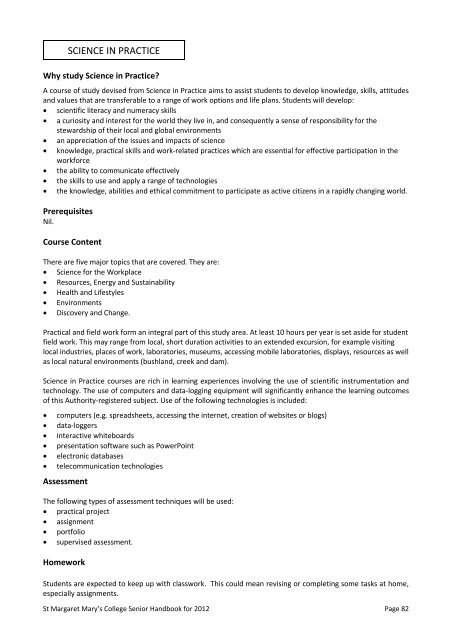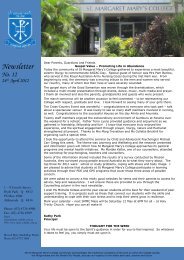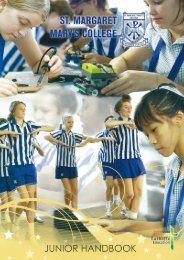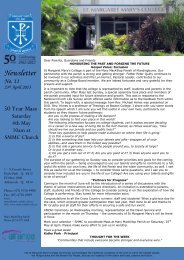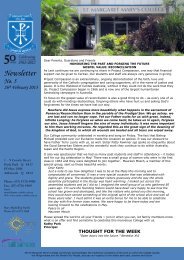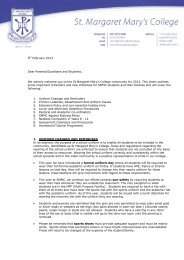SENIOR HANDBOOK for 2012
PRINCIPAL'S MESSAGE - St Margaret Mary's College
PRINCIPAL'S MESSAGE - St Margaret Mary's College
- No tags were found...
You also want an ePaper? Increase the reach of your titles
YUMPU automatically turns print PDFs into web optimized ePapers that Google loves.
SCIENCE IN PRACTICE<br />
Why study Science in Practice?<br />
A course of study devised from Science in Practice aims to assist students to develop knowledge, skills, attitudes<br />
and values that are transferable to a range of work options and life plans. Students will develop:<br />
scientific literacy and numeracy skills<br />
a curiosity and interest <strong>for</strong> the world they live in, and consequently a sense of responsibility <strong>for</strong> the<br />
stewardship of their local and global environments<br />
an appreciation of the issues and impacts of science<br />
knowledge, practical skills and work-related practices which are essential <strong>for</strong> effective participation in the<br />
work<strong>for</strong>ce<br />
the ability to communicate effectively<br />
the skills to use and apply a range of technologies<br />
the knowledge, abilities and ethical commitment to participate as active citizens in a rapidly changing world.<br />
Prerequisites<br />
Nil.<br />
Course Content<br />
There are five major topics that are covered. They are:<br />
Science <strong>for</strong> the Workplace<br />
Resources, Energy and Sustainability<br />
Health and Lifestyles<br />
Environments<br />
Discovery and Change.<br />
Practical and field work <strong>for</strong>m an integral part of this study area. At least 10 hours per year is set aside <strong>for</strong> student<br />
field work. This may range from local, short duration activities to an extended excursion, <strong>for</strong> example visiting<br />
local industries, places of work, laboratories, museums, accessing mobile laboratories, displays, resources as well<br />
as local natural environments (bushland, creek and dam).<br />
Science in Practice courses are rich in learning experiences involving the use of scientific instrumentation and<br />
technology. The use of computers and data-logging equipment will significantly enhance the learning outcomes<br />
of this Authority-registered subject. Use of the following technologies is included:<br />
<br />
<br />
<br />
<br />
<br />
<br />
computers (e.g. spreadsheets, accessing the internet, creation of websites or blogs)<br />
data-loggers<br />
interactive whiteboards<br />
presentation software such as PowerPoint<br />
electronic databases<br />
telecommunication technologies<br />
Assessment<br />
The following types of assessment techniques will be used:<br />
practical project<br />
assignment<br />
portfolio<br />
supervised assessment.<br />
Homework<br />
Students are expected to keep up with classwork. This could mean revising or completing some tasks at home,<br />
especially assignments.<br />
St Margaret Mary’s College Senior Handbook <strong>for</strong> <strong>2012</strong> Page 82


